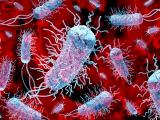Federal health officials have linked whole-head romaine lettuce implicated in eight Alaska cases that are part of a multistate Escherichia coli O157:H7 outbreak to a specific farm in Arizona, but are still tracking the source of contamination in chopped romaine responsible for illnesses in other states.
Identification of the farm adds a new piece to the outbreak investigation puzzle, but since most of the illnesses involved chopped romaine and are parts of different subclusters, officials have a complex tracing task on their hands, with more farms to consider and contamination possible anywhere along the supply chain.
The US Centers for Disease Control and Prevention (CDC) said today that 14 more cases have been reported, pushing the national total to 98 cases. Three more states reported cases—Mississippi, Tennessee, and Wisconsin—putting the number of affected states at 22. At a media telebriefing today, Matthew Wise, PhD, MPH, deputy branch chief for outbreak response at the CDC, said the outbreak is the largest involving E coli O157:H7 since an 2006 outbreak linked to fresh spinach that sickened about 200 people.
Farm source only linked to Alaska cases
Stic Harris, DVM, MPH, director of the Food and Drug Administration (FDA) Coordinated Outbreak Response and Evaluation (CORE), said whole-head romaine linked to illnesses in Alaska, which occurred in eight people at a correctional facility, came from Harrison Farms of Yuma, Ariz. However, the FDA noted that it hasn't determined how the lettuce was contaminated and that contamination could have occurred at any point along the growing, harvesting, packaging, or distribution chain.
Given that most of the patients sickened in the outbreak had been exposed to chopped romaine, representing several subclusters, he said the FDA will be looking at dozens of farms in the Yuma growing region. "Ideally, we'd like to get these [subclusters] mapped out and find convergence, but we're not there yet. We may not get there," Harris said today in a press briefing.
Based on information from growers, federal officials said they can't guarantee there are no more romaine products currently coming out of the Yuma growing region. The area generally supplies all of the nation's romaine between November and March, with harvesting moving north to California at about this time of the year.
The FDA said all romaine from Harrison Farms was harvested from Mar 5 to Mar 16 and is past its 21-day shelf life. Harris said the farm's romaine season is over, and it is now growing grass.
Despite the new development, federal officials said their advice to consumers hasn't changed: Avoid all romaine, unless they can confirm that it didn't come from the Yuma growing region.
Ten people have severe complications
Along with the 14 new cases announced today, the CDC said 3 more people have be hospitalized, raising that total to 46. Ten patients have developed hemolytic uremic syndrome (HUS), a potentially fatal kidney complication. The patients with the most severe form of the disease range in age from 13 to 87, and 3 are children, Wise said. No deaths have been reported.
Earlier this week, the CDC said it is seeing a higher number than usual of hospitalizations for this outbreak. Wise said the pattern is typical for E coli strains that only produce Shiga toxin type 2 (STX2), and that the 2006 outbreak linked to fresh spinach also involved the same STX2 profile, resulting in a similarly higher proportion of severe illnesses.
The latest illness onset was Apr 20, and given delays in reporting, the CDC said it expects to receive reports of more cases. Wise said though all outbreak cases have the same DNA pulsed-field gel electrophoresis (PFGE) pattern, the CDC will be doing whole-genome sequencing on samples from patients to look for any more clues that might line up with what the FDA will find in its testing.
See also:
Apr 27 CDC outbreak update
Apr 27 FDA CORE outbreak update
Apr 25 CIDRAP News scan "CDC: 31 more sickened by E coli-tainted romaine lettuce"


















